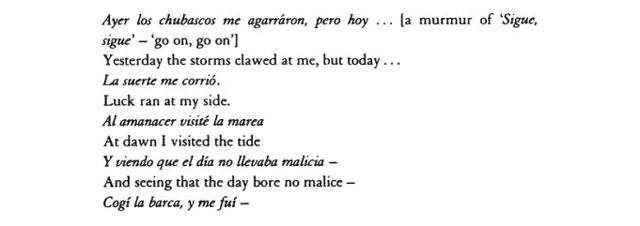April 26, 2013
Voices of the Old Sea




Searching the web on Lewis, I discovered via the Telegraph that he had died yesterday.
April 25, 2013
Ear Worm


Montaigne
Duration: 43 minutes
First broadcast: Thursday 25 April 2013
Melvyn Bragg and his guests discuss the Essays of Michel de Montaigne. Born near Bordeaux in 1533, Montaigne retired from a life of public service aged 38 and began to write. He called these short works 'essais', or 'attempts'; they deal with an eclectic range of subjects, from the dauntingly weighty to the apparently trivial. Although he never considered himself a philosopher, he is often now seen as one of the most outstanding Sceptical thinkers of early modern Europe. His approachable style, intelligence and subtle thought have made him one of the most widely admired writers of the Renaissance.
(Link)
(A translation of the slice of Montaigne's "On Idleness" above that's easier on modern ears, below the fold...)
"When the soul is without a definite aim she gets lost; for, as they say, if you are everywhere you are nowhere.... Recently I retired to my estate, determined to devote myself as far as I could to spending what little life I have left quietly and privately; it seemed to me then that the greatest favour I could do for my mind was to leave it in total idleness, caring for itself, concerned only with itself...."But I find ... that on the contrary [my mind] bolted off like a runaway horse, taking far more trouble over itself than it ever did over anyone else; it gives birth to so many chimeras and fantastic monstrosities, one after another, without order or fitness, that, so as to contemplate at my ease their oddness and their strangeness, I began to keep a record of them, hoping in time to make my mind ashamed of itself."
--Michel de Montaigne, "On Idleness," in On Friendship (Penguin 2004), 69-70.
(Link.)
April 23, 2013
Street by James Nares at the Met

Painter James Nares has a film presented by the Metropolitan Museum of Art that's a 53 minute love letter to NYC. Beautiful, mesmerizing. In some ways, the high speed slow-mo arrest of pedestrian life mirrors his freeze frame brush stroking painting that he is so well known for.
April 16, 2013
What is abstraction, actually?
What is abstraction?
(A question for artists... or notes in preparation for a conversation with one artist in particular: Vince C.)
* Abstraction is not-representation
A withdrawal from the visible world either concrete or imaginary, against a rule set of extra-relational elements which results in representation (abstraction is intra-representational, the interrelation of visual elements solely within the bounded arena of art, canvas or otherwise)
This is why the monochrome became -for some- the ultimate manifestation of abstraction.
Abstraction as a set of intra-relational visual elements, elements freed from their function as cues to an external reality.
Interesting to note that E.H. Gombrich and Rudolf Arnheim, among others, had established these cues on a biological/psychological foundation... therefore in this definition of abstraction as not-representational, the extra-relational part (typically, visual signifiers of an external world) became confined to emotional signifiers, the universe of feeling... therefore this would be a kind of abstraction which is really a representation of inchoate desire
* Abstraction as elaboration (think: the Alhambra)
"To begin with, the Frankfurt intellectuals heaped scorn on him for being in love with concrete reduction when they were in love with abstract elaboration."
concrete reduction versus abstract elaboration
representation leads to reduction (stasis?), abstraction leads to elaboration (movement?)
*Abstraction as intellectual reduction, or a distillation of complex reality into hypothesis (think: Newton)
from the dictionary: dealing with ideas rather than events, not based on a particular instance; theoretical, denoting an idea, quality, or state rather than a concrete object
In this case, abstract painting is/was only a waypoint towards the abstraction that became conceptual art, that abstraction tends to the ultimate state of disembodied ideas
(Blogpost in progress...)
April 15, 2013
Please Feel Guilty, Leon
***
UPDATE: I have read the comments by Leon Krier (however belatedly, I am not yet accustomed to keeping up with the comments in this blog after the recent repair) and I am impressed by his defense. I wrote Mr. Wise for his response to Mr. Krier's comments below and I will update this subject in a subsequent blogpost. The assumption of guilt hinged on an uncritical acceptance of Mr. Krier's critics and I was wrong to do this without reading Krier's "Albert Speer, Architecture" for myself. Therefore, I have struck the title for this post.
***

I've mentioned the architectural and urbanistic work of Leon Krier in earlier blog posts (here, for example). This morning, I read a book review by Michael Z. Wise of Krier's recent publication via Monacelli Press, "Albert Speer, Architecture". Here are the first two paragraphs:
In the darkened auditorium, the monumental image looked familiar. But the description was not. "Rather elegant," intoned the white-haired figure at the podium. He was speaking of Adolf Hitler's Reich Chancellery, designed in 1938 by Albert Speer. Up next on the screen was the Nuremberg Party Rally Grounds where brown-shirted Nazis paraded en masse. "I think it is really great architecture," said the lecturer. "You take off the swastikas, and you can admire it without feeling guilty."My stomach turned as I read those words. (Continuing to the second paragraph:)
Audience members shifted awkwardly in their seats, and a few walked out to protest the remarks by Léon Krier, opening a conference on Berlin at the Yale School of Architecture in February. The Luxembourg-born architectural theorist and planner acknowledged the discomfort, saying of his admiration for Speer: "It drives people crazy because they think I am applauding Auschwitz." But he added: "These buildings are full of modern references. It's only the blind who think this is fascist architecture."It's a heavy charge that Mr. Krier has to bear and defend against and from what I've read so far, I don't think he's doing himself enough justice in this regard. Indeed, if we can take Wise at his word, Krier had soiled himself by trying to recuperate Speer and therefore Hitler's ambition as well. According to Wise, Krier...
...argues that the Allies should have spared Speer from prosecution just as they allowed former Nazis, like scientist the Wernher von Braun, to work in the U.S. space program and on military projects. That way Speer could have embellished postwar Paris, Washington and Moscow. "Sometimes a blind eye is turned when the public interest is at stake," Mr. Krier writes wryly--though perfectly in earnest about the missed opportunity. After all, he concludes: "The Führer had cherished all things beautiful."
***
I have long admired Krier for his critique of modern urbanism, which is perhaps the only example that is succinct, vivid and accessible to the wider public. I had used his general ideas as a pattern to model pedestrian cities in the schema which I had fashioned as Parallel Cities, a design-argument for the peaceful coexistence of machine scaled and human scaled urbanism. In particular, I value his formulation of the urban quarter, that it should be no larger than a person can walk for 15 minutes, that it should contain all of the services, amenities and institutions that any city should offer (a place to live, a place to work, a place to learn, a place to get healthy, a place to stay healthy, a place to shop, a place to worship, a place to self govern, etc, etc...). I had assessed his prescriptive architectural formalism from a distance, I recognize the value of formal classism, of the beauty of proportion as it relates to the interrelation of the orders (the holism of bottom/middle/top as opposed to the modernist fascination for the creative strife of discontinuity and fragmentation) but I don't cherish classism to the degree that he does. I just don't feel his frozen music, but the design of his score is amazing.
From his polemic in "Houses, Palaces, Cities", the scale of Krier's architecture and urbanism was always human to my eye. This was for me, his saving grace against the charge of reactionary tendency... and then he took a turn and tried to recuperate Albert Speer's legacy.
WTFBBQ?
Is Leon Krier a fascist, and can he eliminate this stain by simply removing the swastikas? What is fascism? Orwell said that the term is meaningless, another way to describe a bully. Wikipedia describes it as "a form of radical authoritarian nationalism.. Fascists seek to unify their nation through a totalitarian state that promotes the mass mobilization of the national community..." Deeper into their article they discuss one of the tenants of fascism, of palingenesis and modernism, the fusion of a deliberately reincarnated tradition (state or empire, specifically) and the revolutionary tumult of the new. Are all such fusions indicative of fascism, or only certain kinds and combinants? Is classism in itself a signifier of fascism? What about Giuseppe Terragni, who designed the Danteum for Benito Mussolini?
Giuseppe Terragni - Danteum Philippe Honore from AlICe lab on Vimeo.
I don't have the links on hand, but I've read that Le Corbusier is considered by some critics as a fascist for the legacy of his Ville Contemporaine that influenced the mass housing/ghetto-iszing of the urban poor in projects such as Pruitt-Igoe. Is he a fascist too?
No, and perhaps in a hyperbolic and therefore contestable way, yes.
It's important to tease away the differences between ideas that value tradition and institutional legacy, of the preservation of wisdom over time and the ideas that inflict an overt prescription of living standards by force of the state. If we can't make this distinction, we can't learn from history, we will be bereft of wisdom, we would be at the mercy of constant change., a prison of an eternal modernist NOW.
But simply scrubbing off the swastikas can't rehabilitate the architectural legacy of Albert Speer, and to suggest so is to stain oneself irredeemably. What is similar in the work of both Speer and Terragni that is distinct from the broad arc of the gentle humanity of architectural and urbanistic history? Scale and subject.
The agency of scale in fascist architecture is meant to dwarf the individual. People serve the state and to be made to feel small and powerless is the favorite instrument of totalitarianism. But big scale does not directly and simply imply oppression in and of itself. When do we go wrong when we use large scale? How is gigantic scale invoked without the spectre of totalitarianism? For example, is Superstudio's Continuous Monument a covert expression of fascism? Or how about the ambitions of Land Art? Did Joni Mitchell go off the rail when she wanted to be a cog in something turning? Is the fascination of the sublime in art a signal of danger? Questions loom. Throughout all of this, the measure of intent fades into the experience of scale in the built environment. We are never free of the need to continually reassess the civic boundary, of when we have gone over the edge.
Deeper in Wise's review, he touches on how fascism treats the subject of architecture:
In his own introduction to the original issue of "Albert Speer," Mr. Krier wrote: "Auschwitz-Birkenau and Los Angeles are children of the same parents." That offensive phrase has been dropped from his updated introduction but remains part of the facsimile edition included here. Diagrams on another page compare size and layouts of "artistic and industrial ensembles," setting the configuration of the Auschwitz-Birkenau death camp side by side with the 1893 Chicago World's Fair and a Volkswagen factoryAnd what we see here is how people are equated with the elements of architecture, people become cogs in the machine, the machinery of state. This should horrify all decent reader because this is a perversion of architecture. Architecture should serve the people, it provides the backdrop, the setting for life. It should never instrumentalize human beings to serve the state.
April 11, 2013
Swing State by Jane Kim



Jane Kim Gallery mounted a pop up exhibition in the Lower East Side at 119 Hester Street. From her press release:
"Swing State," curated by jane Kim, embraces our world of uncertainty. As a phenomenally layered group exhibition capturing the gray area that thrives between extremes, "Swing State" will open on Sunday April 7, 2010 and unveil the motion behind the pendulum. That awkward space within the center of left and right, old and new as well as abstraction and figuration will be represented by a group of 13 New York based artists: Lisa Beck, David Diao, Steve DiBenedetto, Lydia Dona, Tamara Gonzales, Joanne Greenbaum, David Humphrey, James Hyde, Fabian Marcaccio, Donald Moffett, Thomas Nozkowski, Lucas Samaras, David Shaw
I can completely relate. This is one of the few curatorial statements that I want to know more about.
There are lots of surprises from artists who have well developed vocabularies and careers. Among the many delights of the show, it was wonderful to see Joanne's ceramics and sculptures, a gobsmacking slap to the head surprise in Nozkowski's floor piece, Samaras' paint slathered insect cutlery, Marcaccio's child soldier (wtfbbq?) and Lisa Beck's integration of smashed glass with art store paint-on-canvas.
This is one pop up gallery that looks like it deserves to put down some roots in a place like that.
(Animated gifs by LoopCam)
Feathering the Nest

The move to NYC is coming to fruition, finally, with the renovation of our apartment in the Lower East Side. Pictured above, a temporary kitchen set up while we build out the permanent one.
Here is the work in progress.
(Watercolor of drowned man by Andrew Hahn. The other painting is one of mine from 1995.))
April 5, 2013
Please Stand By

I had never guessed that moving to NYC would be so intense. Intense, yes, but this is off the hook. The build out of the apartment is in its final phase, the most complex: the kitchen. It's a tale of marvel and woe intermixed, I have a new picture of how work gets done in the big apple. More about that later.
Along the way, my computer burped and crashed, I've had to rebuild my files piecemeal. Another tale of woe, but I won't bore you with this. It highlights how dependent we are on our online lives.
In the meantime, a snip from an interesting article about memes (overtones of the art world abound): The Meme Generation by Matt Labash
In 2010, the Huntsville, Alabama, native was interviewed on the local news after a stranger broke into his house in the projects and crawled into bed with his sister. She screamed, Dodson ran to her room, a brief struggle ensued, and the stranger escaped out a window. A very exercised Dodson took to the airwaves, waggling a bus schedule in front of the camera and warning, "We have a rapist in Lincoln Park. He's climbin' in your windows, he's snatchin' your people up, tryin' to rape 'em. So y'all need to hide your kids, hide your wife, and hide your husband cause they're rapin' everybody out here."(Link)Not long after this very compelling rant started making the rounds, it was converted into an even more hilarious song by the Gregory Brothers of Autotune the News. "Bed Intruder Song" (YouTube views: 101,883,932) lodged in the Billboard 100 and hit number one in Sweden. Dodson was a bona fide celebrity. And all the celebrity spoils have ensued: reaping profits from a Bed Intruder Halloween costume, endorsing a "Sex Offender Tracker" iPhone app, working on a rap album, getting busted for pot possession.
At ROFLcon, he vamps it up for well-wishers who throng him, even singing along with the boombox guy when the latter gives Rick Astley a rest and puts on Antoine's song, which is not really Antoine's song, but rather Antoine speak-singing something he never knew would become a song. At a Q&A, Dodson, contemplating the weird life-turn that has brought him to MIT, seems bashful and ghetto fabulous all at once. He's reluctant to put himself all the way out there (though everyone at this conference stresses the importance of embracing your meme--you don't want to be like Star Wars Kid), while obligatorily playing the sassy black sitcom character that white hipsters so clearly enjoy. It's hard to tell if they're laughing with him or at him when they ask questions like, "Do you not have a wife, or are you just hiding her?" (Dodson is openly and flamboyantly gay, hence the joke.)
I ask a straightforward question: What was it like when he saw himself autotuned because his sister had nearly been raped? As the words leave my mouth, I can feel the room turn slightly against me. Someone nearby tsks. How dare I pop the irony bubble? Allowing real-world concerns to intrude on the memesphere is considered bad form.
Dodson gamely responds, "I was upset, you know what I'm saying, due to the fact that [it] happened to my sister. But when they kept showing me the video, I just kept laughing." Sometimes in the memesphere, if you don't laugh, you'll cry. Or worse, get talked about disapprovingly by the hive, like Star Wars Kid.
Not every meme buys all the way in, though, like the "Huh?" guy, for instance. "Huh?" guy's real name is Nate Dern. I encounter him on the "Micro-Fame to Nano-Fame" panel. He leans toward the latter. His big moment came when he uttered one word--"Huh?"--in an AT&T commercial. The part-time actor, finding it funny that he'd been auditioning for three years and that his first commercial consisted of saying one word (which he improvised), posted it to Reddit. From there, as Know Your Meme reports, it hit the front page, and gained 500,000 views in its first 72 hours on YouTube. "Huh?" guy was on his way to memehood.
Dern proves to be thoughtful, as well as amusing. In addition to being an actor and comic, he studies sociology at NYU. He still reads books (books!), and actually recommends a few to me, such as my new bible, the aforementioned You Are Not a Gadget. It's a book that I should've caught when it made a splash two years ago, as someone who writes semi-regular screeds pointing out that the Tech Triumphalists Have No Clothes (in the hope that computers can't replace me when the time comes, as they won't be able to replicate my cynicism). But I'd missed it. Probably because I was busy watching "Bed Intruder" on YouTube. Nobody's pure.
"Huh?" guy seems bemused that so many people here and elsewhere are trying to figure out how to go viral, since most often, people go viral precisely because they weren't trying. (See Antoine Dodson.) "I don't think we're quite at the end of the world," says Dern. "You can find quotations from people who said the same when novels were coming out. But that being said, it is worrisome that there are so many structures in place that reward cheapness."
